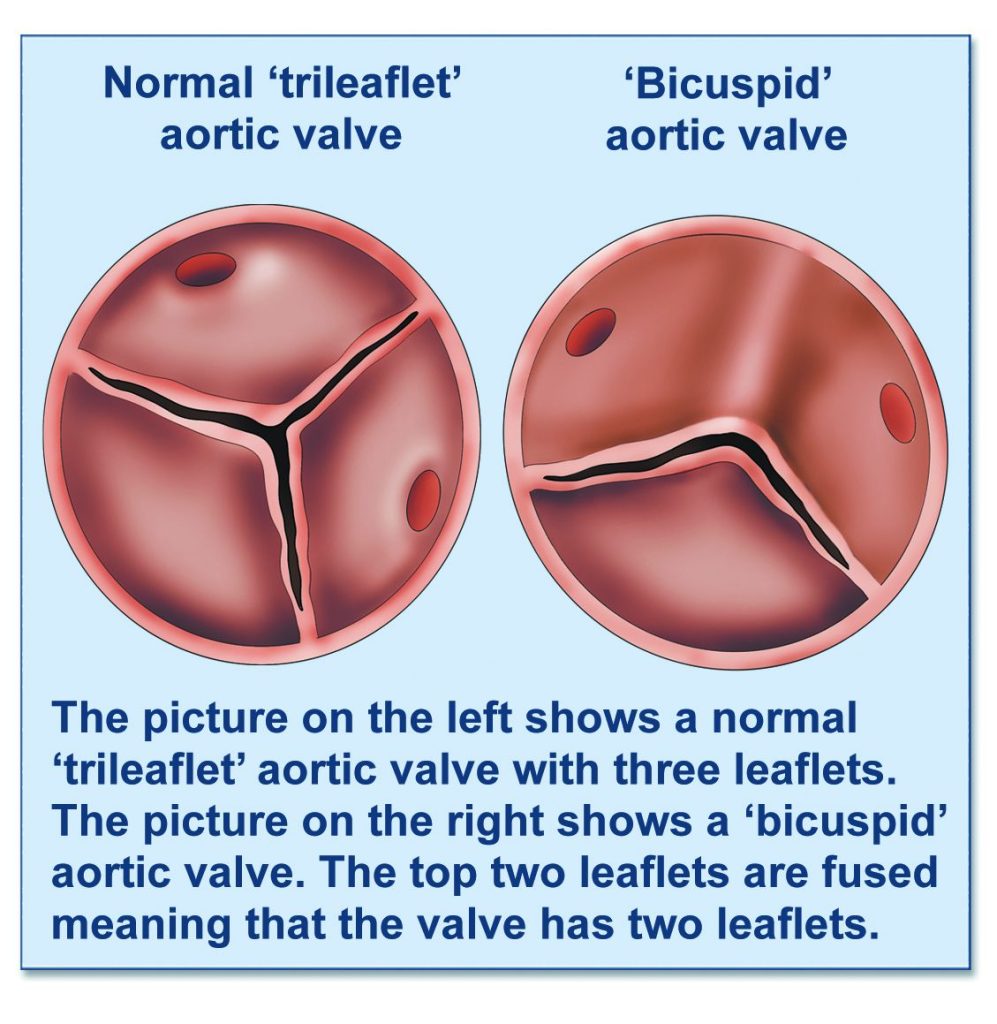What is the aortic valve?
The aortic valve is a structure in the heart that allows one way flow of blood out of the main pumping chamber of the heart (the left ventricle) into the main blood vessel leaving the heart (the aorta). When the heart muscle pumps, the aortic valve opens allowing blood to exit the heart. When the heart muscle relaxes, the valve closes preventing backflow of blood into the heart during this phase, functioning as a ‘one way’ heart valve.
What is a bicuspid aortic valve?
In most people the aortic valve has 3 leaflets (tricuspid valve). About 1 in 50 people are born with an aortic valve with two leaflets (a bicuspid aortic valve.) This is due to abnormal development of the valve whilst growing in the womb and is known as a congenital abnormality. The condition is more common in men than women.

How is bicuspid aortic valve diagnosed?
Bicuspid aortic valve is diagnosed following a cardiac ultrasound (echocardiogram). Most people who are diagnosed with bicuspid aortic valve find out they have the condition by chance, when they have a cardiac ultrasound (echocardiogram) for other reasons. In some cases, the doctor may have heard a heart murmur.
What does it mean if I have a bicuspid aortic valve?
Most people with bicuspid aortic valve will not experience any symptoms and will be simply kept under surveillance.
Bicuspid aortic valves are more prone to early wear and tear (degeneration) than tri-leaflet valves. If the valve degenerates it can become narrowed (aortic stenosis) or leaky (aortic regurgitation). If the valve is leaky or narrowed, the doctor will hear an abnormal sound when they listen to your heart, known as a heart murmur.
Occasionally, people with bicuspid aortic valve will also have a narrowing (coarctation) or stretch (aneurysm) of the main blood vessel (aorta).
If your valve is not working properly (leaky or narrowed) then you may experience symptoms of breathlessness, chest pain, blackouts, dizziness or ankle swelling. You should report these to your Healthcare Professional.
What tests will I need?
Most people with bicuspid aortic valve will have an ECG and echocardiogram. Other tests outlined below may also be performed.
Electrocardiogram (ECG)
Stickers are placed on the chest and the electrical activity of the heart is recorded.
Echocardiogram (Echo or cardiac ultrasound)
During the test an ultrasound probe is placed on the chest and moving pictures of the heart are taken. The test takes around 30 minutes.
Cardiac MRI scan
This is a scan of the heart using a magnet to generate moving video images of the heart. A needle will be inserted into your vein in the arm prior to the test. You lie down in a tunnel for the scan which will take around 30-40 minutes. The scanner is noisy so you will wear ear muffs to protect your ears. The scan is not suitable for those who are claustrophobic.
What are the treatment options available?
Most people with bicuspid aortic valve will not need any treatment and will just be kept under regular surveillance.
In some people the valve will become narrowed or leaky. If this is the case, provided you have no symptoms, you will remain under surveillance but may be seen more frequently.
If the valve becomes severely narrowed or leaky, then you may be referred to a heart surgeon for a heart valve replacement.
If you have a stretch of the aorta (aneurysm), usually this will only require surveillance. Occasionally blood pressure tablets are also recommended. Rarely, the aorta becomes severely stretched and if this is the case then you will be referred to a heart surgeon for consideration of replacement of the aorta.
Is it hereditary?
There is a small risk (around 1 in 10 to 20) that your children and siblings may also have a bicuspid aortic valve (or related heart abnormalities). In some cases, a single one-off screening echocardiogram (echo or cardiac ultrasound) of your family members is recommended. If this is the case your doctor will discuss this with you at your clinic appointment.
Do I need to change my lifestyle?
62109418
As with any type of heart disease, it is important that you follow a healthy diet, keep your weight within a normal range and do not smoke. Most patients with bicuspid aortic valve will be encouraged to take regular gentle exercise but you should check this with your Healthcare Professional. If you have a stretched aorta (aneurysm) then you should avoid heavy lifting. If you are planning pregnancy, you should discuss this with your doctor first and let them know immediately if you become pregnant.
Bicuspid aortic valves are more prone to developing infection (known as endocarditis) than normal aortic valves. Infection usually develops from the mouth or the skin; there are simple steps you can take to reduce this risk:
Teeth
It is important to take good care of your teeth by brushing twice a day and visiting your dentist for regular check-ups (at least once per year). If you have toothache or an abscess it is vitally important that you get treated for this quickly. Be sure to tell your dentist you have a heart condition.
Skin
Keep your skin clean by washing regularly. Wash any cuts and grazes and keep them clean until they heal. See your GP if your skin becomes red or inflamed. Avoid cosmetic procedures (e.g. tattoos, body piercing, fillers etc) that involve breaking the skin.
